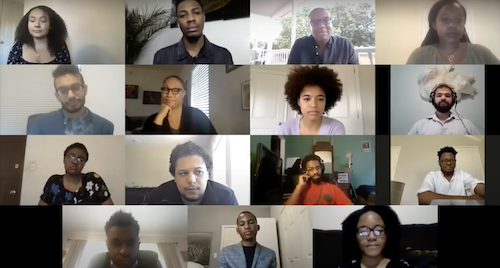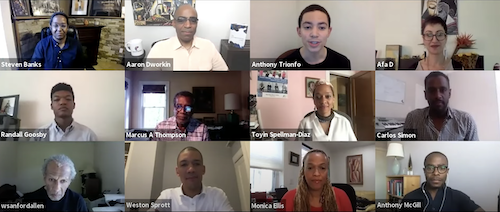by Jarrett Hoffman

On Friday, June 19 (Juneteenth), fifteen recent Oberlin graduates and current students gathered over Zoom on the topic of “Black Voices in the Conservatory.” Presented by the Oberlin College Black Musicians’ Guild and moderated by Troy Stephenson, a 2020 graduate in viola performance, that discussion included perspectives from both the jazz and classical spheres.
Broadcast on social media by Young Concert Artists and The Violin Channel on Wednesday, June 10, “Learning to Listen” brought together twelve diversity advocates and classical musicians from across the country — soloists, orchestral players, chamber musicians, educators, composers, and administrators — including a few faces familiar to Northeast Ohio.
There’s no substitute for watching these illuminating discussions unfold, and I encourage you to do so. The goal here is simply to draw connections and amplify a few points that were made.
One overlap from the roundtables was the desire for urgency. As New World Symphony violist and 2017 Oberlin graduate Marlea Simpson said, “We need to get rid of the phrase ‘this is a process.’ There are simple steps to take now or this season to further equality in music.”
That was echoed in the other panel by Sphinx Organization founder Aaron Dworkin, who said that organizations often get stuck in a pattern of sitting around and talking. “Act thoughtfully, but don’t make it rocket science,” he said. There are some simple actions to take: book more black artists, or program more composers of color — something orchestras can do in their first concerts back once social distancing guidelines allow for it.
Speaking of which, the COVID-19 pandemic, while tragic, also presents organizations with an opportunity to reinvent themselves, Dworkin said. They can come back with a “new normal” that doesn’t just protect people from the virus, but that also represents all members of the community.
The novel coronavirus, as many Oberlin students and alums agreed, is a central reason why the killing of George Floyd has created such a powerful movement for change. Many people are stuck at home, and there’s no escaping the news. And the footage itself offered no ambiguity.
Oberlin Conservatory was of course the institution of note during that Zoom call. Priorities for change that were discussed included creating more spaces for black students within the Conservatory, more institutional support for collaborations with the local community, and changes to the curriculum. For example, as jazz vocalist and rising senior Georgia Heers suggested, Conservatory students should be required to take an introductory course on African American music as well as learn about jazz. Those changes would make for better musicians and create more mutual understanding between the two spheres of the Conservatory.
2015 graduate Joe Williams, a pianist and arts administrator based in Seattle, stressed the importance of faculty mentorship, a type of cross-generational bond that can offer lots of perspective, he said. And speaking of cross-generational, it was both powerful and sad to hear the perspective of Sanford Allen, the first full-time black violinist in the New York Philharmonic (1962-77), compared to that of clarinetist Anthony McGill, the orchestra’s first black principal player.
Allen was encouraged by the fact that conversations such as these are even taking place now, but disheartened that we seem to be rehashing the same issues. Lynchings have made way for police killings, and on the musical side, the Philharmonic has still only had three black players in its history. McGill added, “It’s revealing how two people separated by a few decades can have such similar experiences when you think that the world has progressed a lot.”
The clarinetist also brought up the culture of “silent conservatism” within orchestras, which often avoid getting involved in current events. “But that makes a very bold statement politically, and usually not on the right side of history,” he said. The friendly, communal, yet quiet culture among players and management means that “no progress is ever actually made because no stands are ever taken because it’s too risky.”
Weston Sprott, Dean of the Preparatory Division of the Juilliard School and a trombonist in the Metropolitan Opera Orchestra, noted that what seems fair and necessary to some people comes across as radical to others.
Here, in another cross-generational moment, he addressed three of the youngest musicians on the panel, who helped organize it in the first place: saxophonist Steven Banks, flutist Anthony Trionfo, and violinist Randall Goosby, all First Prize Winners of the Young Concert Artists International Auditions over the past several years. “I hope that what I’m pushing for is a lot,” Sprott said, “and I hope that what you three guys will be pushing for will be more.”
One final shared topic: what it means to be an ally of the movement. Isaiah Shaw, a rising junior at Oberlin studying flute performance and arts administration, hopes that white people will rid themselves of bystander apathy and speak up if they hear racist comments or micro-aggressions.
Violinist Thomas Cooper, a 2017 graduate who now freelances in Boston, asked people to be more self-inquisitive. “If you make an assumption about a person of color, think about what might be affecting that,” he said. And to Marlea Simpson, allyship is action. She encourages people to speak up or do something, and even if they make a mistake, they’ll improve as an ally over time.
Georgia Heers offered a handy comparison: being an ally is like brushing your teeth in that it can’t be an isolated incident. She suggested that people keep reading, having conversations, and sharing resources — keep brushing.
Published on ClevelandClassical.com June 23, 2020.
Click here for a printable copy of this article




